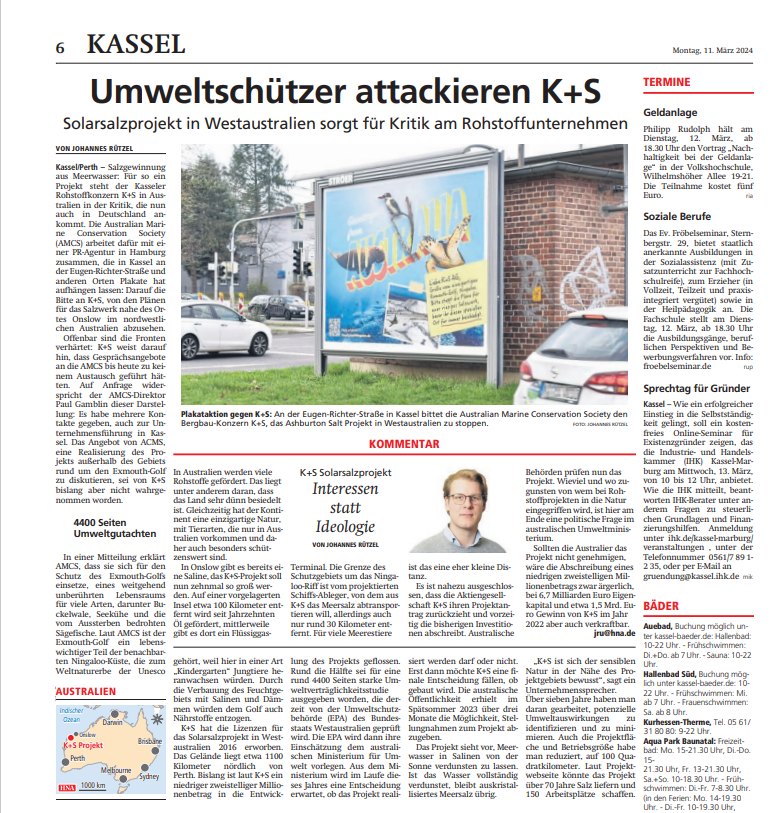
Environmentalists attack K+S
Solar salt project in Western Australia sparks criticism of the raw materials company
Kassel/Perth – Salt extraction from seawater: For such a project, the Kassel-based
raw materials corporation K+S is under scrutiny in Australia, which has now also reached Germany. The Australian Marine Conservation Society (AMCS) is collaborating with a PR agency in Hamburg, which has put up posters in Kassel on Eugen-Richter-Straße and other locations: On them, the request to K+S to refrain from the plans for the saltworks near the town of Onslow in northwestern Australia.
Apparently, the fronts are hardened: K+S points out that offers of dialogue to the AMCS have not led to any exchange to date. In response to inquiries, AMCS director Paul Gamblin contradicts this representation: There have been several contacts, including with the company’s management in Kassel. However, K+S has so far not taken up AMCS’s offer to discuss the realization of the project outside the area around the Exmouth Gulf.
In a statement, AMCS explains that they are committed to protecting the Exmouth Gulf, a largely untouched habitat for many species, including humpback whales, dugongs, and the endangered sawfish. According to AMCS, the Exmouth Gulf is a vital part of the neighboring Ningaloo Coast, which is a UNESCO World Heritage Site because it serves as a kind of “nursery” where young animals grow. The construction of salt pans and dams in the wetlands would also deprive the Gulf of nutrients.
K+S acquired the licenses for the solar salt project in Western Australia in 2016. The site is located about 1100 kilometers north of Perth. According to K+S, a low double-digit million amount has been invested in the development of the project so far. About half has been spent on an environmental impact study spanning around 4400 pages, which is currently being reviewed by the Environmental Protection Authority (EPA) of the state of Western Australia. The EPA will then present its assessment to the Australian Ministry for the Environment. A decision on whether the project can be realized or not is expected from the ministry later this year.
Only then does K+S want to make a final decision on whether to proceed with construction. The Australian public was given the opportunity to submit comments on the project for over three months in late summer 2023.
The project involves evaporating seawater in salt pans using the sun. When the water is completely evaporated, crystallized sea salt remains. “K+S is aware of the sensitive nature near the project area,” says a company spokesperson. They have spent over seven years identifying and minimizing potential environmental impacts. They have also reduced the project area and operating size to 100 square kilometers. According to the project website, the project could supply salt for over 70 years and create 150 jobs.
Background Panel
Australia produces many raw materials. This is partly because the country is sparsely populated. At the same time, the continent has unique wildlife species found only in Australia and thus particularly worthy of protection.
There is already a salt pan in Onslow, and the K+S project is expected to be ten times larger. Oil has been extracted from an island about 100 kilometers away for decades, and now there is a liquefied natural gas terminal. However, the proposed ship dock, from which K+S intends to transport the sea salt, is only about 30 kilometers away from the boundary of the protection zone around the Ningaloo Reef. For many marine animals, this is a relatively small distance.
It is almost certain that the joint-stock company K+S will not withdraw its project application and write off its previous investments prematurely. Australian authorities are now reviewing the project. How much and where interference with nature occurs in favour of whom in resource projects ultimately becomes a political question in the Australian Ministry for the Environment.
If the Australians do not approve the project, the write-off of a low double-digit million amount would indeed be regrettable, but with €6.7 billion in equity and about €1.5 billion in profit from K+S in 2022, it would also be manageable.
